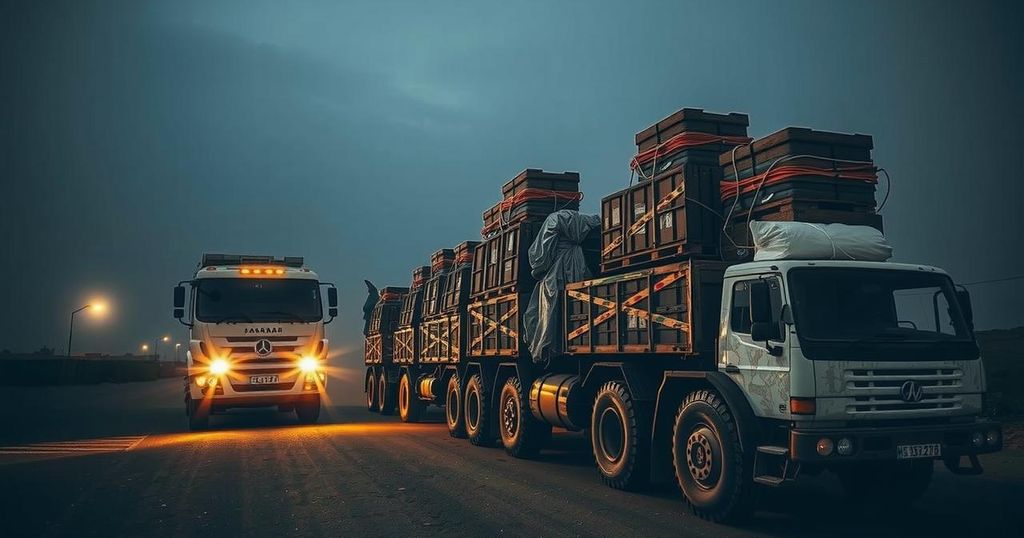First Humanitarian Aid Convoy Arrives at Sudan’s Famine-Hit Zamzam Camp

Zamzam camp in Sudan, housing 500,000 displaced individuals, has received its first aid convoy in months. The UN World Food Programme delivered supplies following significant delays caused by conflict and impassable roads. The ongoing civil war has created severe hunger across the region, with Zamzam officially classified as being in famine conditions. This convoy is part of an extensive initiative aimed at helping those in critical need, underscoring the urgency for sustained international support.
Zamzam camp in Sudan, which shelters approximately 500,000 internally displaced individuals suffering from famine, has received its first humanitarian aid convoy in several months. The United Nations World Food Programme (WFP) confirmed the arrival of aid trucks on Friday. Aid deliveries had been delayed due to escalating violence in el-Fasher, combined with impassable roads caused by the rainy season. The ongoing civil war—a battle for power between the Sudanese army and the paramilitary Rapid Support Forces (RSF)—has resulted in a severe humanitarian crisis, displacing 10 million people and exacerbating food insecurity.
The crisis in Zamzam intensified in April, when RSF forces began clashes aimed at capturing el-Fasher from military control. An independent evaluation in August categorized Zamzam as being in famine conditions, where extreme food shortages affect over 20% of households, and malnutrition disproportionately impacts children. The recent aid convoy is part of a broader initiative by the WFP to assist those in dire conflict zones, with three convoys dispatched carrying provisions sufficient to feed 1.5 million individuals for over a month.
WFP officials emphasize the importance of ensuring safe passage for aid trucks and sustained international support, underlining the urgency of delivering assistance to those in need. “These trucks carry more than just food; they carry a lifeline for people caught in the crossfire of conflict and hunger,” stated Laurent Bukera, WFP’s regional director for eastern Africa. Despite allegations against both warring factions regarding the obstruction and looting of aid supplies, both sides vehemently deny such actions.
The convoy that reached Zamzam on Friday had its origins in Adré, a town near the Chad border, and had faced closure until recently due to an order from the army-controlled government. While the corridor was temporarily reopened, the government has expressed concerns it may facilitate arms delivery to RSF forces. However, assurances have been made to keep this route open for an additional three months. Concurrently, a separate WFP convoy from Port Sudan is on its way to provide further assistance to Zamzam camp.
The grave humanitarian situation in Sudan underscores the urgent need for immediate and sustained aid efforts amid ongoing conflict, highlighting the critical role of international support and cooperation.
Sudan is currently experiencing a humanitarian disaster resulting from an extended civil war that has displaced millions of people. The conflict primarily involves the Sudanese army and the RSF, leading to significant disruptions in essential services and food supplies. As conditions deteriorate, many regions, particularly in Darfur, have faced worsening famine conditions. Zamzam camp, a refuge for those displaced by the violence, has become emblematic of this crisis, as it struggles with extreme food insecurity and malnutrition. The recent delivery of aid marked a critical respite for the camp, which has been cut off from essential supplies for months due to the conflict and adverse weather conditions.
The arrival of the first aid convoy to Zamzam camp represents a pivotal moment amidst a catastrophic humanitarian crisis in Sudan. With increasing numbers of displaced individuals experiencing dire food shortages, the international community’s commitment to delivering assistance and ensuring safe passage for aid distribution is vital. Continued monitoring and support for affected populations are necessary to alleviate the ongoing suffering and prevent further escalation of the crisis.
Original Source: www.bbc.com








